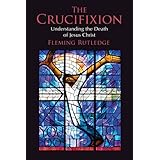 Fleming Rutledge, in her book The Crucifixion, makes one of the most robust and concerted defenses/explanations of substitutionary atonement in recent years (even “penal” substitution in a sense, though heavily qualified). All the more interesting because she is a mainline Episcopalian and outside the usual evangelical networks who like to espouse such things. She begins by noting: “It is not an exaggeration to say that in some circles there has been something resembling a campaign of intimidation, so that those who cherish the idea that Jesus offered himself in our place have been made to feel that they are neo-Crusaders, prone to violence, oppressors of women, and enablers of child abuse” (p. 464).
Fleming Rutledge, in her book The Crucifixion, makes one of the most robust and concerted defenses/explanations of substitutionary atonement in recent years (even “penal” substitution in a sense, though heavily qualified). All the more interesting because she is a mainline Episcopalian and outside the usual evangelical networks who like to espouse such things. She begins by noting: “It is not an exaggeration to say that in some circles there has been something resembling a campaign of intimidation, so that those who cherish the idea that Jesus offered himself in our place have been made to feel that they are neo-Crusaders, prone to violence, oppressors of women, and enablers of child abuse” (p. 464).
Rutledge presents a survey of biblical texts and historical theology to show the antiquity and ubiquity of substitutionary atonement. She notes all the major objections and seeks to sympathetically assuage them. In the end, she prefers a largely Barthian view of substitutionary atonement, interspersed with themes from the Apocalyptic Paul (i.e. Lou Martyn) and sacrificial motif drawn from the homilies of Anglican divines (i.e. Lancelot Andrews). It is a fair and I think mostly successful integration of substitutionary atonement with the Christus Victor theme – something I espouse similarly in my Evangelical Theology.
She concludes:
The theme of substitution allows full scope for us to understand the depth and completeness of Christ’s involvement in the human condition. From this perspective, it is truly hard to understand why there is so much resistance to it. How does it make the self-sacrifice of Christ more palatable to say that he gave himself only for our benefit, rather than in our place? Even if it is construed exclusively as a victory over the Powers – as in the Christus Victor motif – does that explain why the Son of God had to undergo crucifixion to defeat Sin, Death, and the devil? Does it nor require some suspension of disbelief in any case? Why should we resist the most obvious sense of the words “for us” and “for me” in the case of Jesus on the cross? Since he clearly did not deserve what happened to him, why is it not right to conclude that we should have been there instead of him? Is that not the most basic sort of human reaction? We have all heard people saying, “It should have been me instead of him.” Why should we want ruthlessly to eliminate such thoughts concerning Christ on the cross? The plain sense of the New Testament taken as a whole gives the strong impression that Jesus gave himself up to shame, spitting, scouring, and a degrading public death beyond the eyes of the whole world, not only for our sake but also in our place. (p. 529).
I hope Fleming Rutledge’s book The Crucifixion does for mainline churches what John Stott’s book The Cross of Christ did for evangelical churches – renew their focus and appreciation of the cross, and lead to forthright preaching of the cross!











